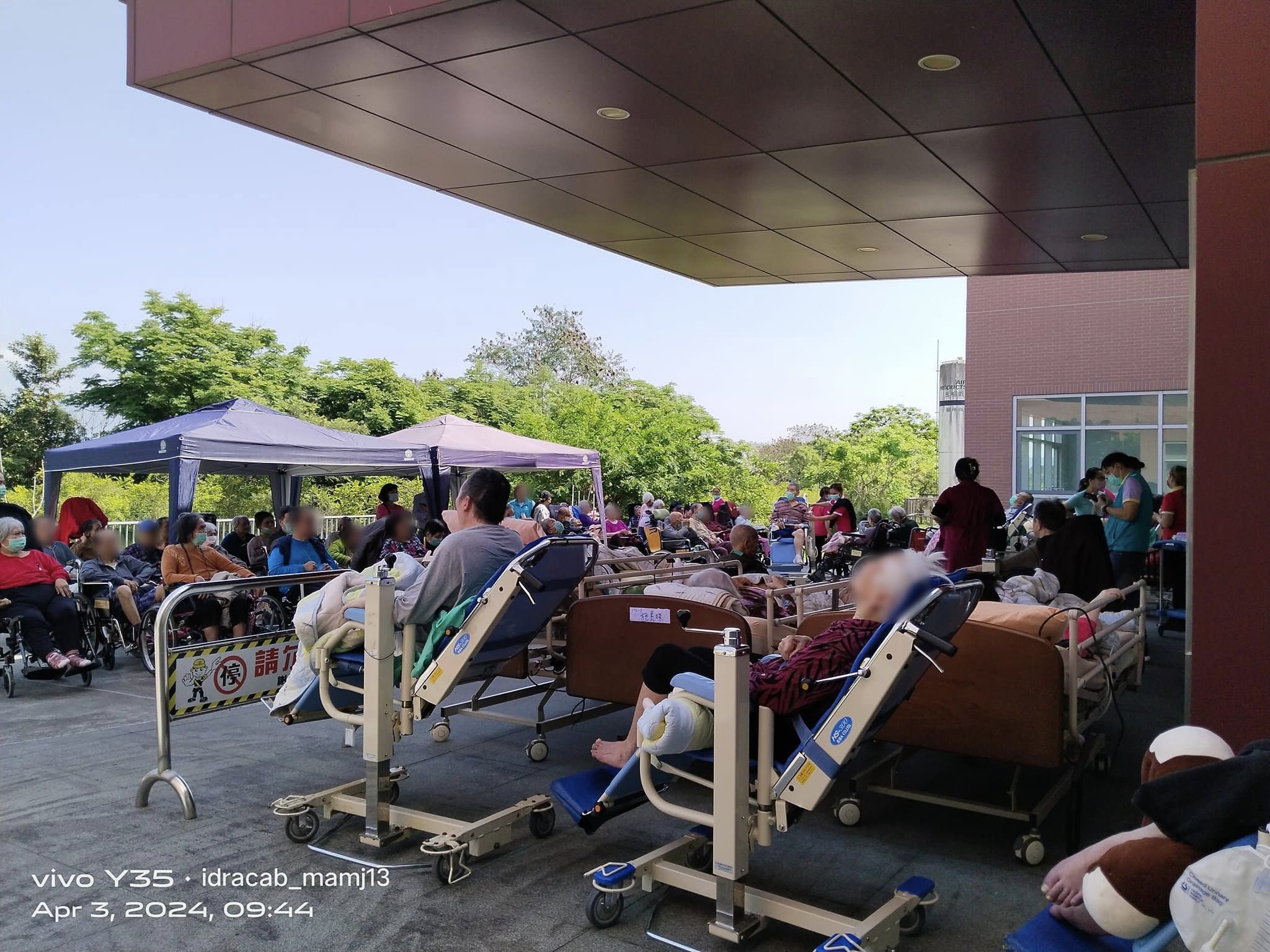SUMMARY
This is AI generated summarization, which may have errors. For context, always refer to the full article.

MANILA, Philippines – “Hindi tayo sa lindol mamamatay. Sa nerbiyos tayo mamamatay (We won’t die from the earthquake. We will die because of anxiety),” Filipina nursing aide Mhalou Pereyra recalled her roommate as telling her, almost two days after a massive earthquake hit their host state, Taiwan.
A magnitude 7.2 earthquake – Taiwan’s strongest in 25 years – rocked the island on Wednesday, April 3, killing at least 12 and injuring hundreds. Mhalou worked in a nursing home in Shoufeng Township, which is in Hualien County, just over a dozen kilometers from the epicenter of the quake.
Miraculously, no one in that nursing home was injured or killed. That evening, 40-year-old Mhalou returned to her night duty.
Getting patients out
Mhalou was already awake by the time the earthquake struck just before 8 am on Wednesday. She had been relaxing in bed, as she was supposed to have three days off.
Then the shaking began. While she had experienced earthquakes before, nothing topped the intensity of this one.
“Sobrang lakas…. ‘Yung mga gamit namin nagtumbahan, naglaglagan ang mga drawer namin at nagbukasan (It was so strong…. Our things fell over, and our drawers fell and things were spilling out),” Mhalou told Rappler over a call on Friday, April 5.
Even before the shaking stopped, they knew they had to get their patients out. At the nursing home, the first two floors were the patient wards, while the dorm was on the third. They rushed downstairs to evacuate their patients before they could think of themselves.
On the first floor were the patients who were not bedridden, while the bedridden ones stayed on the second floor. The patients at the time were around double the number of staff, who were mostly women. They were used to lifting their patients, but this was a race against time.
“Mabigat ang mga pasyente. Lalo na kapag mga bedridden. Tapos plus pa ‘yung mga equipment…. ‘Yung sakay ng pasyente na bakal ‘yun eh. Tapos ‘yung wheelchair. Dagdag mo pa ‘yung pasyente na overweight,” she said.
“Parang hindi na namin iniisip kung nasaktan ba kami, napagod ba kami or what. Ang pinasalamat namin is lahat kami safe. Lahat ng pasyente safe,” she added.
(The patients are heavy, especially the bedridden ones. Then you add the equipment…. The ones made of metal. Plus the wheelchairs. Then you factor in the patients who are overweight. We did not think if we got hurt, if we got tired or what. We were just thankful that all of us are safe, all of the patients are safe.)
All the staff and the patients stayed outside until 3 pm that day. Still, Mhalou said she worried about the patients, thinking maybe they would get a heat stroke from being outside for too long.
Fortunately, she said, the building was earthquake-resistant, and the administration had everything under control. Even as water pipes broke and some parts of ceiling fell, they were able to return to operations the evening of the quake.
Still, aftershocks persisted, keeping the staff on edge.
Supporting each other
There are around 150,000 overseas Filipino workers (OFW) in Taiwan, plus around 9,000 non-OFWs. Four Filipinos were reported injured as of Friday, with no one missing or killed so far.
The earthquake left many Filipinos scared and in shock. Mhalou said that she and her fellow nursing aides helped each other stay mentally strong. There are 16 Filipinos in the nursing home she worked in.
“May kanya-kanyang abilidad at may kanya-kanyang pahinaan. Siguro po, unang kailangan unawain natin ‘yung ibang tao na hindi niya kayang i-handle ‘yung emosyon nila. Na kailangan, kung pinanghinaan siya, kailangan natin tulungan siya na mapalakas ‘yung kalooban,” she said.
(We have our own abilities and weaknesses. I think we need to understand that some people cannot handle their emotions. When they feel discouraged, we should help them gain mental strength.)
Mhalou also said that employers should be considerate of their workers who may be emotionally traumatized and may not be able to work so soon.
In an earlier interview, a factory worker in Taoyuan told Rappler that she and her co-workers began work just an hour after the earthquake happened, even though there were aftershocks.
Department of Migrant Workers (DMW) Officer-in-Charge Hans Cacdac said in a press briefing on Thursday, April 4, that if OFWs need some time off to recover from the stress of the earthquake, this can be appealed with their recruitment agencies and employers.
“Knowing how strong our coordination is with them, it won’t be a problem if there are workers who are still not prepared to go back to work due to the trauma,” Cacdac said in a mix of Filipino and English.
The DMW also said that OFWs can avail of psychosocial counseling from Philippine authorities in Taiwan. The department also activated hotlines for Filipinos in Taiwan and their families in the Philippines.
OFW rights group Migrante International, in a statement on Friday, highlighted the need for continuous support for Filipinos in Taiwan.
“While the DMW’s Taiwan Help Desk and hotline are already established, it should be maintained and accessible while preparing to provide food, water, health supplies, medical assistance, and temporary shelter to all OFWs affected and in need,” said Migrante. – Rappler.com
Add a comment
How does this make you feel?





There are no comments yet. Add your comment to start the conversation.